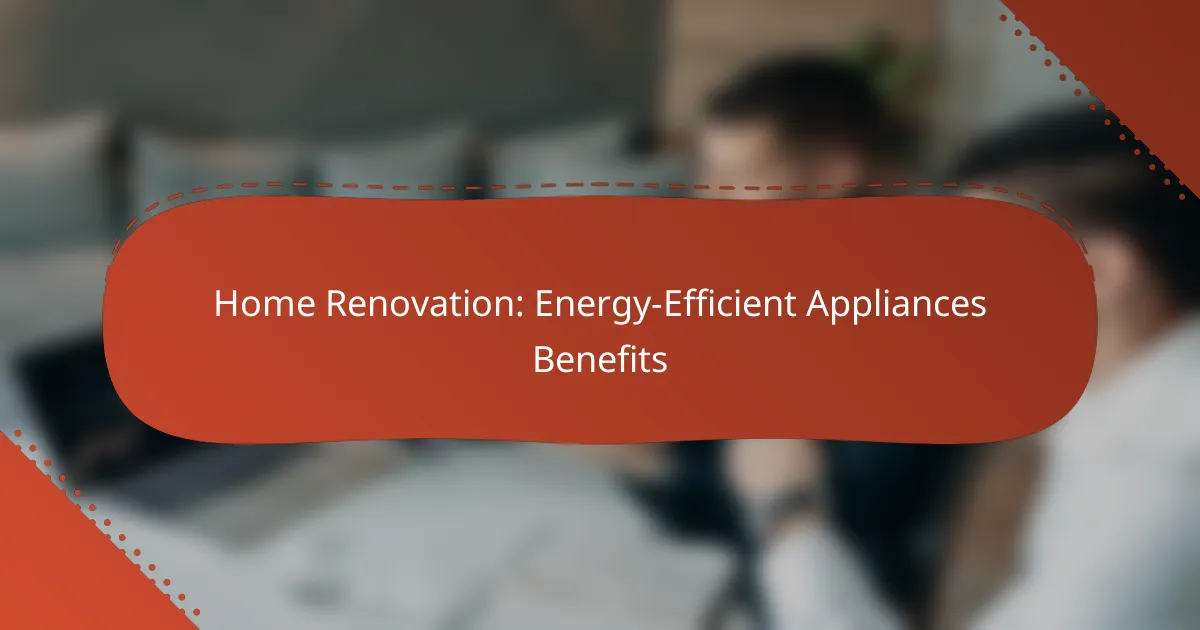Incorporating energy-efficient appliances during home renovations can lead to substantial savings on utility bills while also benefiting the environment. These appliances utilize advanced technology to optimize energy consumption without compromising performance, making them an ideal choice for eco-conscious homeowners. By selecting Energy Star-rated products and smart solutions, you can enhance your home’s efficiency and contribute to a more sustainable future.
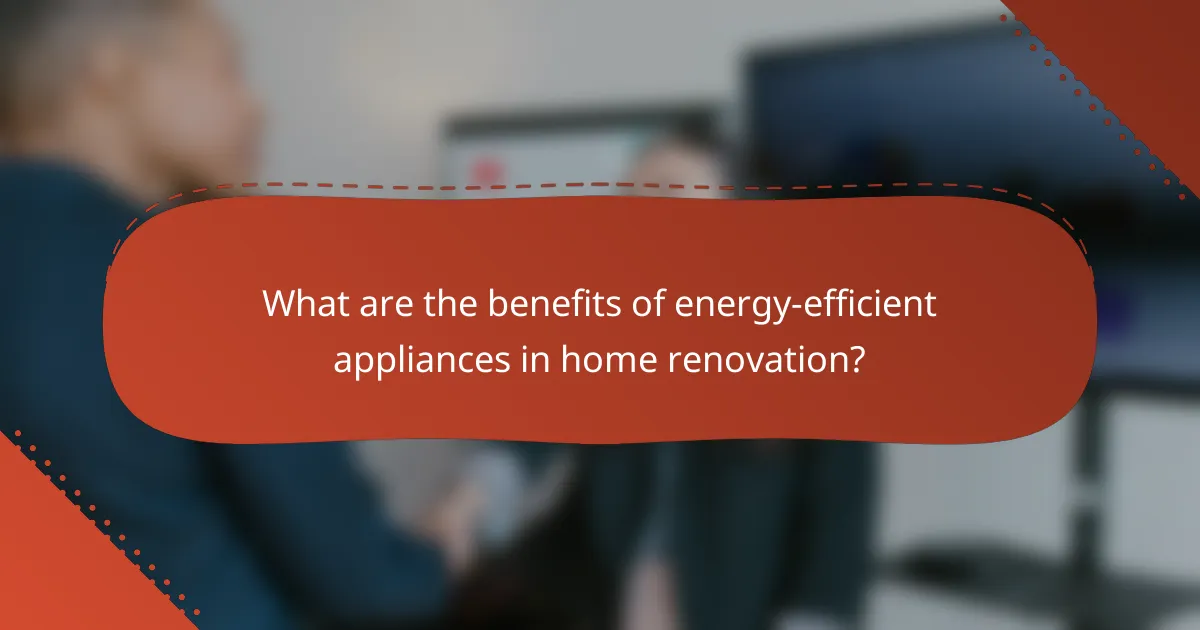
What are the benefits of energy-efficient appliances in home renovation?
Energy-efficient appliances offer significant advantages during home renovations, primarily by reducing utility costs and environmental impact. These appliances use less energy while maintaining performance, making them a smart choice for homeowners looking to save money and contribute to sustainability.
Lower energy bills
One of the most immediate benefits of energy-efficient appliances is the reduction in energy bills. These appliances consume less electricity or gas, which can lead to savings of 10-50% on monthly utility costs, depending on the appliance and usage. For example, replacing an old refrigerator with an ENERGY STAR-rated model can save around $200 over its lifetime.
To maximize savings, consider using appliances that have the highest energy efficiency ratings available. Look for labels that indicate compliance with local energy standards, as these can guide you to the most efficient options.
Reduced carbon footprint
Energy-efficient appliances contribute to a lower carbon footprint by consuming less energy, which in turn reduces greenhouse gas emissions. By choosing these appliances, homeowners can play a part in combating climate change, as less energy consumption means less reliance on fossil fuels.
For instance, using an energy-efficient washing machine can save several hundred kilograms of CO2 emissions annually. This not only benefits the environment but also aligns with many local and national sustainability goals.
Improved home comfort
Energy-efficient appliances can enhance home comfort by providing consistent performance and better temperature control. For example, energy-efficient HVAC systems maintain desired temperatures more effectively, leading to a more comfortable living environment year-round.
Additionally, many energy-efficient appliances operate more quietly than their traditional counterparts, reducing noise pollution in the home. This can significantly improve the overall living experience, especially in open-concept spaces.
Increased property value
Investing in energy-efficient appliances can increase your home’s property value. Potential buyers often prioritize energy efficiency, making homes with modern, efficient appliances more attractive in the real estate market. This can lead to quicker sales and potentially higher offers.
When renovating, consider highlighting the energy-efficient features in your marketing materials. This can help set your property apart from others and justify a higher asking price.
Enhanced appliance lifespan
Energy-efficient appliances typically have longer lifespans compared to standard models. This is due to their advanced technology, which often includes better materials and construction methods that reduce wear and tear. For example, an energy-efficient dishwasher may last several years longer than a conventional one.
Regular maintenance can further extend the life of these appliances. Simple tasks like cleaning filters and ensuring proper ventilation can help keep them running efficiently for years, maximizing your investment.
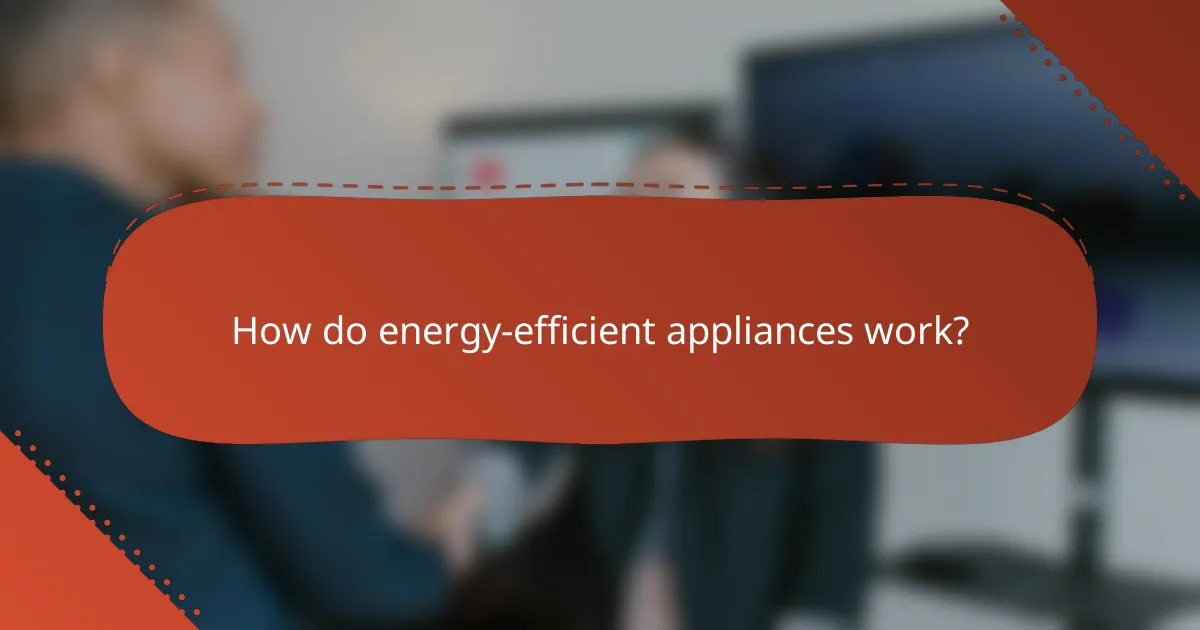
How do energy-efficient appliances work?
Energy-efficient appliances are designed to use less energy while maintaining performance. They achieve this through advanced technology and optimized energy consumption, which can lead to significant savings on utility bills.
Utilize advanced technology
Energy-efficient appliances incorporate innovative technologies that enhance their performance. For example, refrigerators may use variable-speed compressors that adjust their operation based on cooling needs, while washing machines might feature sensors that determine the optimal water level for each load.
These technologies not only reduce energy consumption but also improve the longevity of the appliances. When selecting appliances, look for models that meet or exceed the ENERGY STAR certification, which indicates they use at least 10-50% less energy than standard models.
Optimize energy consumption
Energy-efficient appliances are designed to minimize energy use during operation. This includes features such as programmable settings that allow users to run appliances during off-peak hours when electricity rates are lower, thereby maximizing savings.
To further optimize energy consumption, consider the size and capacity of the appliance. Choosing the right size for your household needs can prevent unnecessary energy waste. For instance, using a dishwasher only when fully loaded can significantly enhance its efficiency.
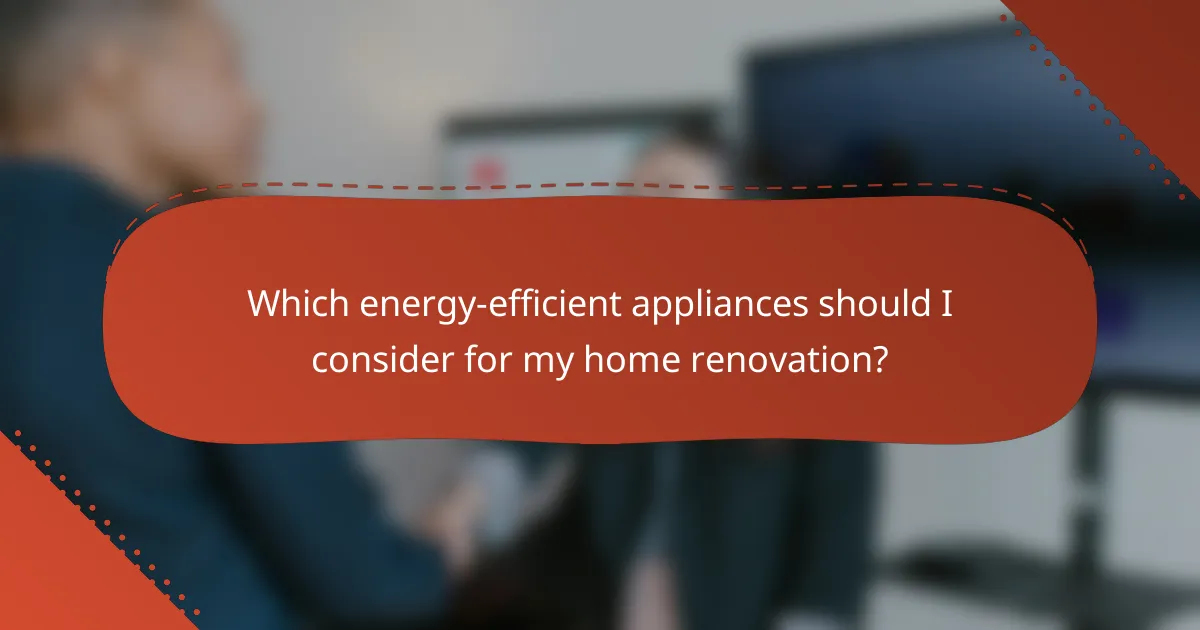
Which energy-efficient appliances should I consider for my home renovation?
When renovating your home, consider energy-efficient appliances that can significantly reduce energy consumption and lower utility bills. Key options include Energy Star-rated refrigerators, high-efficiency washing machines, smart thermostats, and LED lighting solutions.
Energy Star-rated refrigerators
Energy Star-rated refrigerators are designed to use less energy than standard models, often consuming up to 15% less. When selecting a refrigerator, look for features like adjustable shelves and temperature controls that enhance efficiency.
Consider the size and layout of your kitchen to ensure the refrigerator fits well and meets your family’s needs. Models with top or bottom freezers tend to be more energy-efficient than side-by-side options.
High-efficiency washing machines
High-efficiency washing machines use significantly less water and energy compared to traditional models. These machines often feature advanced technology that optimizes water usage and cycle times, making them a smart choice for eco-conscious homeowners.
When choosing a washing machine, look for models with a high Energy Factor (EF) rating. Front-loading machines typically offer better efficiency than top-loading ones, so consider this when making your selection.
Smart thermostats
Smart thermostats can help manage your home’s heating and cooling systems more efficiently, leading to energy savings. These devices learn your schedule and preferences, automatically adjusting temperatures to optimize energy use.
When installing a smart thermostat, ensure it is compatible with your HVAC system. Look for features like remote access and energy usage reports to help you monitor and adjust your energy consumption effectively.
LED lighting solutions
LED lighting solutions are a highly energy-efficient alternative to traditional incandescent bulbs, using up to 80% less energy. They also have a longer lifespan, reducing the need for frequent replacements.
When upgrading to LED lighting, consider the brightness and color temperature that best suits each room. Dimmable LED options can provide flexibility in lighting levels, enhancing both energy savings and ambiance.
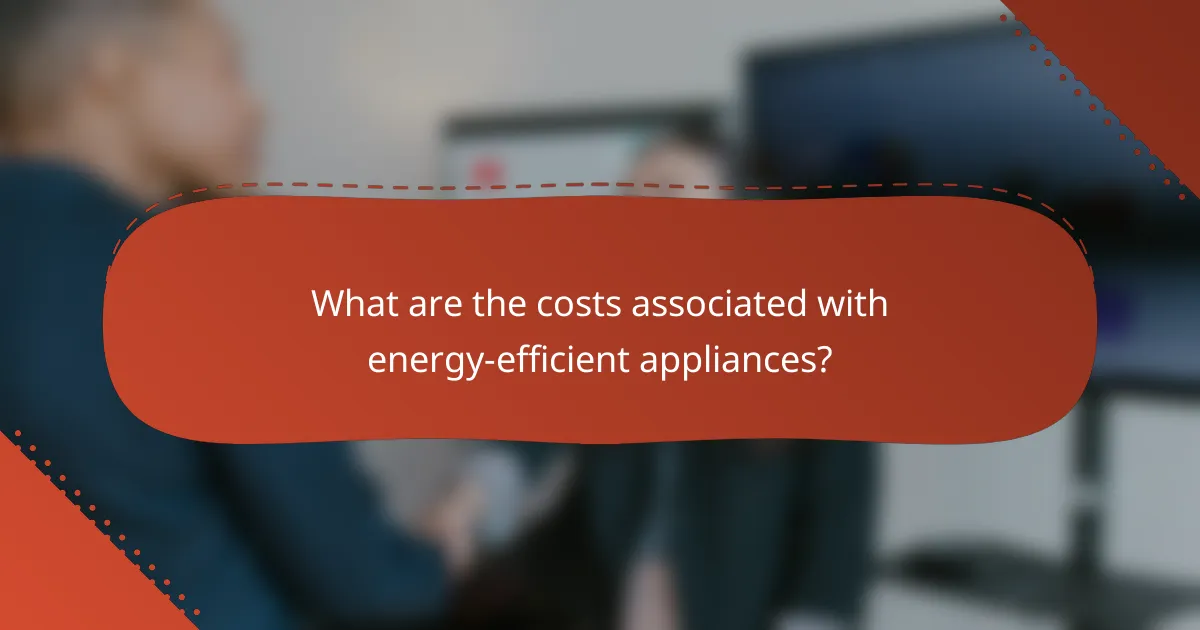
What are the costs associated with energy-efficient appliances?
The costs associated with energy-efficient appliances include the initial purchase price and potential long-term savings on utility bills. While these appliances often have a higher upfront cost, they can lead to significant savings over time through reduced energy consumption.
Initial purchase price
The initial purchase price of energy-efficient appliances typically ranges from 10% to 50% more than standard models. For example, an energy-efficient refrigerator may cost between $1,000 and $2,000, while a conventional one might be priced between $800 and $1,500. It’s essential to consider this upfront investment when planning your budget.
Additionally, some energy-efficient appliances qualify for rebates or tax credits, which can help offset the higher initial costs. Check local utility programs or government incentives to maximize your savings.
Long-term savings
Long-term savings from energy-efficient appliances can be substantial, often leading to reductions in energy bills of 20% to 50%. For instance, an energy-efficient washing machine may save a household around $100 annually in water and electricity costs. Over the appliance’s lifespan, these savings can add up significantly.
When evaluating long-term savings, consider the appliance’s energy rating, which indicates its efficiency. Look for ENERGY STAR certified products, as they meet strict efficiency guidelines and can provide a clearer picture of potential savings. Always factor in your local energy rates to estimate actual savings accurately.
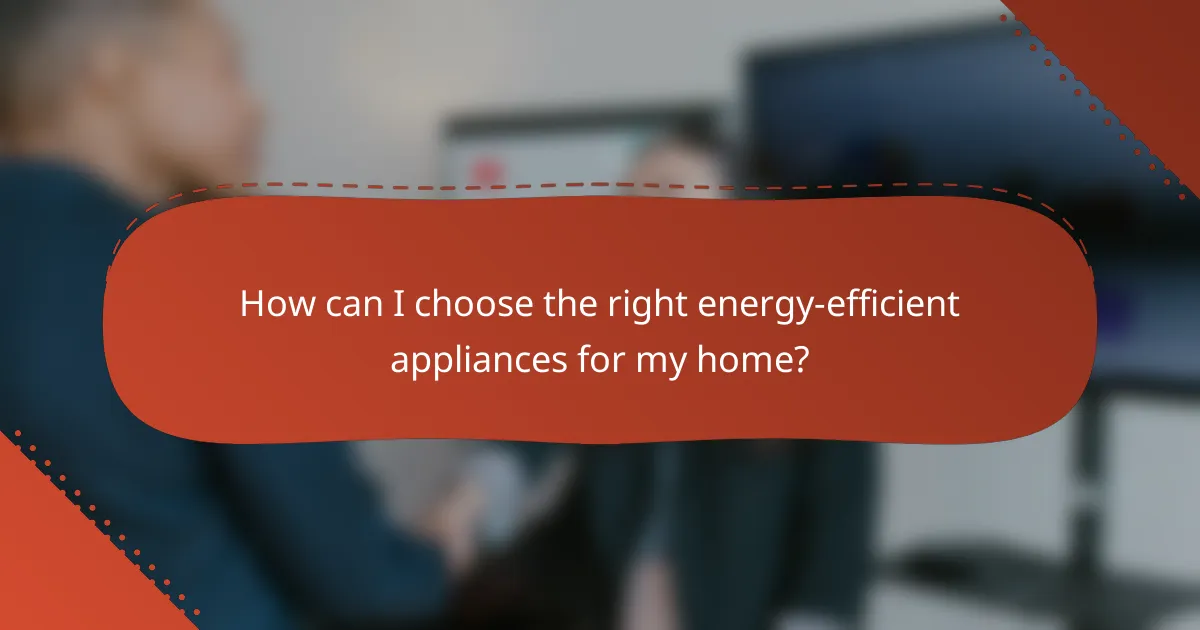
How can I choose the right energy-efficient appliances for my home?
To choose the right energy-efficient appliances for your home, start by evaluating your needs and budget while considering the energy ratings of each option. Focus on appliances that not only save energy but also fit your lifestyle and usage patterns.
Assess energy ratings
Energy ratings indicate how efficiently an appliance uses energy compared to others. Look for labels such as the ENERGY STAR certification, which signifies that the appliance meets strict energy efficiency guidelines set by the U.S. Environmental Protection Agency.
When assessing energy ratings, consider the annual energy consumption, usually expressed in kilowatt-hours (kWh) for electric appliances. For example, a refrigerator with an annual consumption of around 400-600 kWh is generally considered efficient, while older models may exceed 800 kWh.
Additionally, check for local regulations or incentives that may apply to energy-efficient appliances. Some regions offer rebates for purchasing ENERGY STAR-rated products, which can help offset the initial investment.
